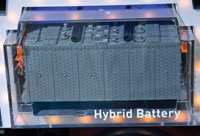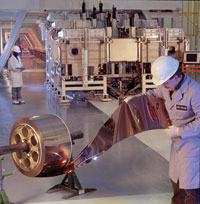 If you want to get your company in on the ground floor of the new alternative energy economy, go to
If you want to get your company in on the ground floor of the new alternative energy economy, go to
The state’s continued support for innovation, commercialization and manufacturing diversification is creating opportunity for businesses in 21st century technologies. Supplementing the effort are five new Renaissance (virtually tax-free) Zones available for facilities dedicated to cellulosic biofuels along with tax incentives for purchase of biomass harvesting equipment and conversion of gas pumps for delivery of ethanol, biodiesel or other new fuels.
Green energy manufacturing is considered to be a perfect fit for Michigan given the state’s superior tool and die, metal fabrication, and metalworking capabilities; manufacturing expertise and facilities that can be retrofitted to produce items such as wind turbines; a manufacturing supplier network that is already starting to supply green-tech manufacturers; tremendous research and development expertise in universities and corporate research centers; a world-class workforce; and an outstanding wind resource.
‘Advanced
 Michigan
MichiganFord Motor has received $55 million in refundable tax credits under the Michigan Advanced Battery Credits Initiative. It is accelerating plans to produce next-generation hybrids, plug-in hybrid electric vehicles and battery electric vehicles. General Motors, which received $167 million under the program, will build a $43 million battery plant in
The commitment of these heavy hitters gives companies doing business here an advantage in competing for a share of $2 billion in U.S. Department of Energy Office of Energy Efficiency and Renewable Energy funds available for manufacturing advanced battery systems and components.
Solar Power Belt in Mid
A cluster of solar energy companies has grown in proximity to Midland-based Dow Chemical, the nation’s largest chemical company (gearing up to sell solar roof shingles by 2011), and Energy Conversion Devices, a
 pioneer in the solar power generation industry located in Rochester Hills (Oakland County). They are backed by the state’s extensive university research apparatus.
pioneer in the solar power generation industry located in Rochester Hills (Oakland County). They are backed by the state’s extensive university research apparatus.Hemlock Semiconductor, near
United Solar Ovonic, Auburn Hills (
Auburn Hills-based Octillion Corp. is collaborating with
In Midland, Massachusetts-based Evergreen Solar is building a $55 million factory to begin large-scale production of parts for solar panels utilizing its energy-efficient proprietary crystalline technology called String Ribbon TM.
Research Universities: Getting Down to Business
 Michigan
MichiganThe Michigan Economic Development Corporation is launching a competition among
Success Story
Adding further luster to the reputation of the state’s university system is the award of the FRIB – Facility for Rare Isotope Beams – to Michigan State University (MSU) in
The MSU campus has been home to the National Superconducting Cyclotron Laboratory (NSCL), the nation’s leading rare isotope research facility, since 1963. The FRIB, described as a thousand times more powerful than the Cyclotron, could bring 400 jobs and $1 billion in economic activity to the region, attracting as many as 1,000 scientists from around the world. Today approximately 10 percent of
 Michigan Centers of Energy Excellence are working to accelerate commercialization of next-generation energy technologies in production of cellulosic ethanol from wood waste (Mascoma, Michigan State and Michigan Technological universities); making biodiesel fuel from municipal waste (Swedish Biogas International, City of Flint, Kettering University); refining high-value specialty and fine biochemicals and biofuels from natural feedstocks (Working Bugs, Michigan Technological University); and conversion of process waste effluent into cellulosic ethanol (American Process, Valero Energy, Decorative Panels International, Michigan Technological University).
Michigan Centers of Energy Excellence are working to accelerate commercialization of next-generation energy technologies in production of cellulosic ethanol from wood waste (Mascoma, Michigan State and Michigan Technological universities); making biodiesel fuel from municipal waste (Swedish Biogas International, City of Flint, Kettering University); refining high-value specialty and fine biochemicals and biofuels from natural feedstocks (Working Bugs, Michigan Technological University); and conversion of process waste effluent into cellulosic ethanol (American Process, Valero Energy, Decorative Panels International, Michigan Technological University).
Harnessing Wind Energy is a Wind-Win
With up to 8,000 precision parts in every wind turbine, the emergence of the global wind industry is a perfect fit for the state’s tried and tested engineering workforce. The U.S. Department of Energy finds that
The Upper Hand
Companies doing business in Michigan have access to innovative economic development tools, highly skilled workforce, world-class universities, beautiful communities and 21st century infrastructure. Visit www.MichiganAdvantage.org to learn how Michigan can give your business the Upper Hand.

